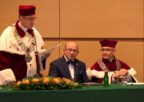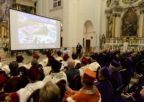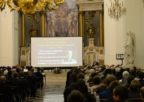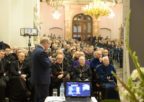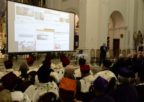On the occasion of the inauguration of the academic year on 3 October 2016 Prof. Henryk Skarżyński has presented at the Papal Faculty of Theology in Warsaw the lecture titled ‘Dysfunctions of interpersonal communication cause isolation and suffering’.
Prof. Skarżyński in the seminary church in Warsaw did not speak only about the suffering: in the words of Saint Augustine – ‘In is impossible not to suffer in this world’. When we see a person fighting a severe and chronic disease, it is obvious that this person is suffering. But are we aware of the fact that a person who has problems with hearing is suffering too? I do not mean here a total deafness, it is rather rare. I mean such hearing dysfunctions that hamper daily communication. Recently there had been many popular publications about suffering and depression. Only in one of them, unfortunately, I have found a brief mention that they may be related to hearing disorders.
We must realize that the auditory pathway is our primary channel of information. It develops before all other senses in the prenatal life. Using the state of the art technologies, functional magnetic resonance and encephalography we can follow its development. These technologies allow us also – using the auditory pathway – learning what happens in our brain, even to localize precisely centers responsible for pain and physical suffering (unfortunately it is more difficult when talking about a broader definition of pain and suffering). The functional magnetic resonance assessment of brain functions allow us also to see, if a person is capable of identify with another suffering person and find the abnormal effects suggesting the inability of compassion (psychopaths).
Why hearing disorders that impede communication are such a significant cause of suffering? Communication is indispensable in development of modern societies. Hearing makes it possible to develop speech and language, or rather languages (today, without a command of several languages it is hard to get quality education or work). Meanwhile a growing percentage of people in the world have problems with hearing. According to information gathered at the continental and world scientific congresses, already more than a milliard of people has different hearing problems impeding their everyday communications. It means that hearing problems are a serious social problem.
Our society is growing older. Less and less children are born while the number of the elderly people grows. Even three quarters of people over 75 years of age have different kinds of hearing dysfunctions. These people suffer because they cannot hear, cannot understand so they withdraw from social life. We have to prevent their isolation, accommodate their special needs.
Studies conducted by the Institute of Physiology and Pathology of Hearing show that hearing disorders become more and more widespread among children. Only a few in a thousand children are born deaf. But at the early school age we can observe various hearing disorders in about 20% of children. It is a price the young generation pays for living in ubiquitous noise, using headphones to listen to music and other such things.
Can we prevent suffering resulting from hearing disorders? Yes, we can. We should keep looking for such diagnostic tests that will allow us detecting the first signs of hearing loss as early as possible. Early diagnostics should be able to tell us that in 10 years this or that person can develop a disorder, but we can prevent or slow down its progress by protecting hearing. And, if the disorder develops, it should be treated. Today we have technology enabling improving hearing in almost any patient.
Not only we, the physicians, but all of us have a chance of helping the people who suffer. We can do it by strengthening the multigenerational relationships, cultivating family values and solidarity. Institutional help cannot replace family! There is no such system in the world that is capable of providing everyone with what they expect. It we forget about the traditional family values, we have little chance to win the fight against isolation, pain and suffering.







